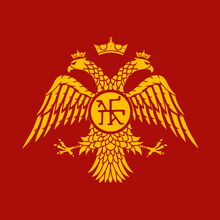This article is about the de facto nation known as the Byzantine Empire. For the former settlement once called Byzantium, see Constantinople.

The Byzantine Empire (or Byzantium or, more formally, the Eastern Roman Empire) is a small but influential nation situated around the Bosphorus Strait that separates continental Europe from Asia. Byzantium got its start with the decision of then Roman Emperor Constantine the Great to found the Empire's new capital in the area. Originally named "Nova Roma", the settlement soon became known as Constantinople in his honour, a name it retains to this day.
The state has been a fixture in the Balkans for 1700 years, although at its territorial height, Byzantium controlled the entire eastern half of the Mediterranean world and much of the western half. This peak was short-lived, as numerous enemies like the Arabs, Persians, Seljuks, Ottomans, Mongols and even the Western Romans themselves chipped away at its territory starting around 600. Still, in spite of dramatic territorial losses, Byzantium has proven to be quite resilient, being able to enjoy a revival in political fortunes after the state successfully recaptured Constantinople after World War II.
At A Glance[]
Nation Name: Senatus Populusque Romanus (officially, though for diplomatic purposes it identifies itself as the Basileia Rhomaion, the Greek rendering of "Roman Empire", in formal settings)
Demonym: Byzantine
Capital: Constantinople
Independence (de facto): Restoration of the Western Roman crown by the Senate when it appointed Rimbosa as the Western Emperor, 580 (final division of the Western and Eastern courts)
Population: (see list of countries by GDP)
Official Language: Greek
Government Type: Absolute Monarchy
Head of State: Basileia Alexia Comnenus
Head of Government: Basileia Alexia Comnenus
Official Religion: Eastern Orthodox Christianity
Largest Religion: Eastern Orthodox Christianity
Economy Type: Mixed, mostly socialist
Currency: Byzantine drachma (1d=US$10)
Constitution: No
Summer Time: Yes
Calling Code: +330
Internet TLD: .byz
Maritime Boundary (nm): 24
Aircraft Code: BZ
Military Strength: 2% of the population
Military Capability Score (out of 100, rating by Worldwide Defence Trade Association (WDTA)): 85 (Good)
Technological Innovation Score: Military (WDTA): 80/100 (Good), Scientific (University poll): 80/100 (Good), Other (University poll): 90/100 (Strong)
Economic Rating (by Standard & Poor): 80/100 (Good) (See list of countries by GDP)
Economic Freedom Index (by Standard & Poor): 65/100 (partly free- considerable latitude is given to found and operate businesses by locals, but all businesses and monetary flows are tightly controlled. In addition, the state engages in protectionist economic policies)
Health Care Rating (by Doctors Without Borders): 70/100 (Above Average)
Health Care System: Universal
Political Freedom Index (by Reporters Without Borders): 40/100 (political discourse is allowed though it is tightly monitored, and the government engages in heavy censorship of all media)
Drug Laws: All except coffee, alcohol and cigarettes are banned.
Gun Control: Only those in a law enforcement, the Army or other governmental role can legally obtain and use a gun, in practice, the state is one of the leaders in the "gun trade" and the government turns a blind eye to this.
Environmental Policy Rating (by Greenpeace): 100/100 (complete attention paid to environmental concerns)
Identity[]
Strictly speaking, the Byzantine Empire and the Roman Empire are two halves of the same state, as legally speaking, their governments are recognized as two parts of the same whole. Furthermore, both in cultural parlance and in political discourse, both Rome and Byzantium view each other as separate "halves" of the same state, with both rulers believing the other is their subordinate. Both Byzantium and Rome have officials who are technically appointed to administer the other's territory, with the Byzantines having a "Duke of the Romans" while the Romans have a "Thracian Prefect". Effectively, both serve as the de facto diplomats between the two nations, administering only each other's embassies in their respective capitals.
Operationally, Byzantium and Rome are two different polities and have operated as such since Rimbosa, and thus the two states have begrudgingly accepted each other's functional independence. Other states have since followed this lead, having diplomats in both empires, although many have weighed in on the separation issue. Common discourse worldwide (mostly in informal settings) have come to overwhelmingly favour the Romans as the stronger "half" due to their vast economic, territorial and military advantages, a status that has earned much consternation within Byzantine circles.
Until 1453, the Byzantines always referred to themselves and their empire as "Roman", using the Greek forms such as "Basileia Rhomaion", "Romania" and "Rhomaioi" (or "Romaioi"), done in a deliberate manner to prevent the West from claiming all the prestige and influence that would come in retaining the Roman heritage. However, after the Fall of Constantinople at the hands of the Ottomans, the Byzantines were effectively reduced to the state of an Ottoman vassal in the Morea, which caused an intense cultural shock. Since the Western crown could boast it never fell to the state of vassalage, Byzantine prestige took a hit, causing many to pine for the state that the Ottomans had just wrested from them.
Thus, the term "Byzantine" was born in the last few decades of the 15th century, first as an informal term but later gaining traction within political and academic circles as well. There is no consensus as to the origin of the word, but scholars agree the word was coined to signify the Byzantines' belief that their half of the Roman Empire should be based in Constantinople, and thus the people began to strongly identify with the city. Speculation suggests that "Byzantium" was chosen so as not to spook the Ottomans who might not have been aware that the original name of Constantinople was Byzantium, but this explanation isn't agreed upon.
Nevertheless, "Byzantium" stuck, and continues to stick to the present day as modern-day Byzantines have come to view Constantinople as their "Rome" and thus see no reason to acquiesce to Western demands that the capital be placed in Rome again. Thus, this period of Byzantine history has seen unprecedented levels of nationalism emerge, so much so that there are even rumblings that some Byzantine figures want to forget about the whole "Roman" concept and forge their own identity and nation. However, even this has met fierce scrutiny, mostly about the prestige of the state losing its Roman heritage once and for all.
